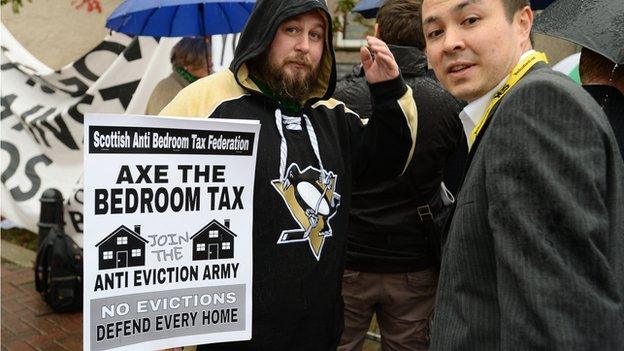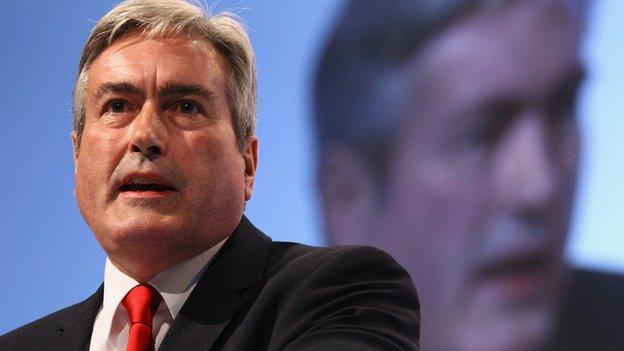The minor prophet and the bedroom tax miracle
- Published

The Bedroom Tax has led to protests
In these atheistic, agnostic and even ahistorical times, the Prophet Micah is not often referenced in contemporary political discourse. Iain Gray managed it today - advising his fellow MSPs to act justly, to love mercy and to walk humbly with God.
But then we were witnessing what passes for a miracle in these prosaic, mundane days. The SNP and Labour working together.
They loathe and distrust each other, constantly suspecting (with good, well-founded reason) the motives of the other. But it seems they hate the so-called Bedroom Tax still further.
Mr Gray delivered an excellent speech; passionate, elevated and thoughtful. We are accustomed to rhetoric of that standard from the Finance Secretary John Swinney. But it is perhaps a wee while since the chamber heard the former Labour leader in full spate.

Iain Gray called up on the prophet Micah in his speech to parliament
To return to Micah. Mr Gray said that the qualities of justice and mercy were due to those social tenants who were, he argued, struggling with the withdrawal of benefit if they have a spare room - aka the Bedroom Tax.
And the humility? That was incumbent upon both the big parties at Holyrood. They had to set aside their customary constitutional rhetoric, to disdain the politics of insult - and to co-operate in an attempt to find ways to mitigate the impact of the Bedroom Tax.
As to the detail, that has yet to emerge in full. The UK Department of Work and Pensions already provides funds to ease the withdrawal of the spare room subsidy, through a mechanism known as Discretionary Housing Payments (DHP).
Mr Swinney is topping up that fund - but is limited by DWP rules on the basis that benefits policy is reserved to Westminster.
Devolved powers
Labour continues to argue that there are other avenues available - and Gavin Brown for the Conservatives appeared to endorse that argument while stressing, more generally, that his party's preference was for measures to grow the economy.
But Mr Swinney believes that his Budget which has to be carried into law might face challenge if it contained measures which explicitly or implicitly breached the extent of devolved powers as set out in the Scotland Act, which founded the Scottish Parliament.
Labour says: supply funds to councils to soak up debt. That, they say, has worked in Renfrewshire. It could, they argue, be replicated across Scotland.
Mr Swinney's office has two concerns. Firstly, might that be interpreted as an attempt by the SG to bypass and thus breach the law?
Secondly, by definition, such an approach involves tenants going into arrears - with a possible impact upon their credit record.
Best of all, Mr Swinney argues, is for Scotland to gain control over benefits - and scrap the Bedroom Tax. Second best? For Westminster to scrap the tax now. And third, for the DWP to lift the cap enabling Scottish ministers to alleviate hardship now.
However, Mr Swinney made two commitments. He is now allocating £22.85m to top up DHP - a higher total, up from £20m, owing to revisions. That leaves £12m to meet the total estimated cost of the policy to tenants in Scotland.
The money, he says, is there. It is going nowhere. It will not be reallocated. He hopes the DWP will agree to lift the cap. If not, he will examine ways to allocate the cash to ensure that there are no evictions purely on the grounds of problems from the so-called Bedroom Tax. (I believe that passage attracted careful legal vetting.)
Because you can see the problems there, can't you? Again, is there a danger of legal challenge for evading UK statute? Further, how do you decide which evictions are spurred solely by the Bedroom Tax? How do you allocate the funds? Perhaps simply to councils to enable them to take the hit from rent arrears?
For the Liberal Democrats, Willie Rennie argued vigorously in favour of the lines in the budget devoted to enhanced childcare: an issue he has pursued, to effect, for some time. That, he said, enabled the LibDems to back the budget too.
A day then, mostly, for reconciliation. A day for giving a place to the opposition. But don't expect it to last. As Micah said: "Do not gloat over me, my enemy. Though I have fallen, I will rise."
- Published4 February 2014
